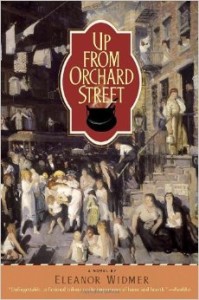 Although dubbed a novel, Up From Orchard Street is a memoir in the same way Frank McCourt’s Angela’s Ashes was—honest, poignant, often painful, but filled with the sights, smells and sounds of the immigrant experience. Widmer’s story takes place in New York’s Lower East Side in the ‘30s, where many Eastern European Jews had settled in search of a new and hopefully better future in the U.S.
Although dubbed a novel, Up From Orchard Street is a memoir in the same way Frank McCourt’s Angela’s Ashes was—honest, poignant, often painful, but filled with the sights, smells and sounds of the immigrant experience. Widmer’s story takes place in New York’s Lower East Side in the ‘30s, where many Eastern European Jews had settled in search of a new and hopefully better future in the U.S.
Manya Roth, aka Bubby, is the indulgent mother of flashy womanizing smart-alecky Jack, her only child from a brief whirlwind marriage in Manya’s teens tragically cut short in Jack’s infancy. Now grown, married and with two children of his own, Jack and his family live in Manya’s cold-water roach-ridden tenement flat on Orchard Street where Manya plies her renowned cooking skills, turning her living room into a restaurant for the old world Jews who populate the area. Mouth-watering descriptions of Manya’s blintzes and latkes, her brisket and borscht, her matzoh ball soup and her kreplach, her knishes and her kugel fill the pages and brought back childhood memories of my own grandmother’s cooking.
Jack and his wife Lil are self-absorbed happy-go-lucky fashion plates who stroll through life without letting it touch them. They are adult children oblivious to their own children, and so Elka and Willy Roth are left to be raised by their loving generous hard-working Bubby. Willy is a fearful and damaged child, while Elka is the precocious and insightful narrator for whom Bubby is a lifeline.
Through Elka’s eyes, we meet the many colorful characters who populate her life: neighbors, relatives, friends, all of them struggling to realize their dreams in different ways while plagued by intense poverty, illness, and the encroachment of changing times and traditions. Parts of this book spoke directly to my own family’s experiences and where it diverged, it painted a fascinating portrait of that lost era.
